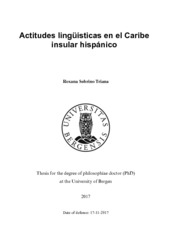| dc.description.abstract | The present research’s main goal is to identify the linguistic attitudes that the speakers of the Insular Hispanic Caribbean show towards their own varieties of Spanish and those of their neighbors. The countries considered for the study were Cuba, Puerto Rico and the Dominican Republic, which constitute the nucleus of the Caribbean dialectal area of Spanish. The attitudinal study has been carried out from an integrative perspective in which sociolinguistics, sociology, social psychology, perceptual dialectology and cognitive sociolinguistics have been complemented. The linguistic attitude is assumed from a multicomponential perspective, integrated by cognitive, affective and behavioral elements. On the other hand, the presuppositions raised from the perceptual dialectology are taken into consideration to base the analysis of perceptions and beliefs that underlie the cognitive component that motivate the attitudes. From the methodological point of view, a questionnaire composed of eleven questions was applied in each of the capitals of the countries studied. The sample was composed of a total of 196 informants, a sample that was formed from the establishment of fixed quotas taking into account the sociolinguistic variables: sex, age and level of education. The data obtained were subjected to a qualitative and quantitative analysis that offer information about the beliefs, valuations and perceptions that motivate the linguistic attitudes manifested by the Antillean Spanish speakers towards their language varieties. The presentation of the results was subdivided according to the dialectal perceptions, the attitudes towards the own variety or towards the other two variants in question; taking into account in each case the results obtained by countries and establishing comparisons between them. That allows to arrive at generalizations and to characterize the Antillean Spanish-speaking area from a perceptual and attitudinal point of view. Among the results obtained, it highlights the idea that the Spanish speakers of the studied Antilles perceive their varieties inserted in a common dialectal area, with linguistic and extra - linguistic similarities, while establishing a great perceptual distance of their varieties with others such as those of Spain, Mexico, Argentina and Colombia. In general, Cubans, Dominicans and Puerto Ricans manifested positive attitudes towards their own ways of speaking based, fundamentally, on the high valuation of their varieties of language as an identifying element. Likewise, positive attitudes towards neighboring varieties prevailed, but there are differences in beliefs, perceptions and assessments that allow establishing a certain hierarchy of these varieties, according to the criterion of the speakers, and give raise to marked discriminatory positions. | en_US |
